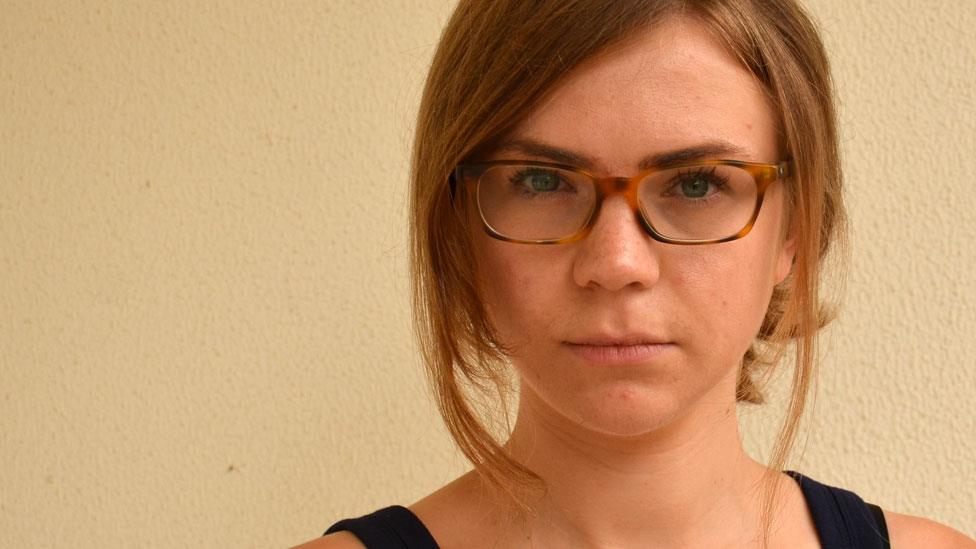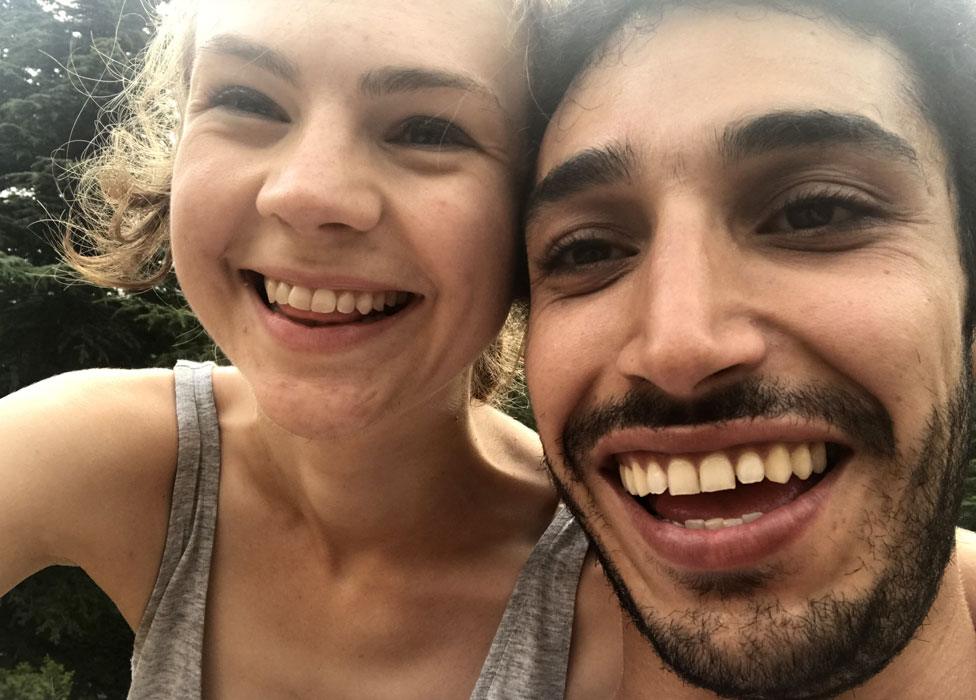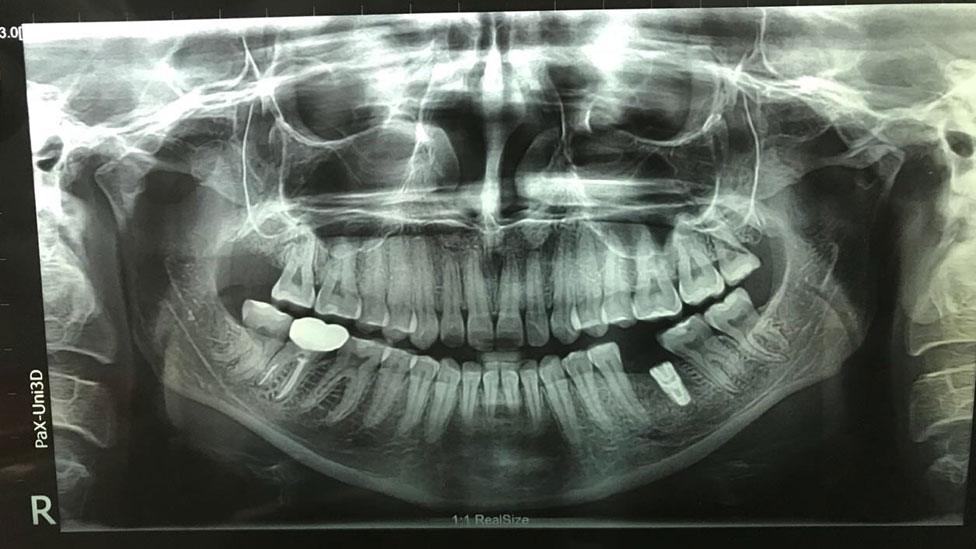Why my bones are crumbling at 27
- Published

Lizzie Porter lived with anorexia throughout her teens. Now in her late 20s, she's been discovering that those years of starvation have left a lasting imprint on her body.
"You have osteoporosis in your spine and osteopenia in your hip. I'm going to put you on calcium and vitamin D and I think you should take them forever. We need to prevent breaks and fractures."
It is May 2018, and my doctor's words jolt me out of a long-standing state of denial.
They come with a set of complicated graphs, which apparently show my low bone density. I don't understand them. But I can read the words printed next to a fuzzy X-ray-like picture of my spine: "World Health Organization classification: osteoporosis. Fracture risk: high."
For years, I have muddled along, pretending to myself that I had pretty much made a full recovery from anorexia. Yes, I was told back in 2010 that I had osteoporosis. But over the next eight years I persuaded myself that things must have improved, that the holes in my spine must have healed.
Sadly, they haven't.

Osteoporosis and osteopenia
Osteoporosis is a condition in which bones lose their strength and are more likely to break
If your bone density is between the lower end of the normal range and the osteoporosis range, you have osteopenia

I was first diagnosed with anorexia at the age of 12, and soon experienced its unglamorous consequences. As summers grew hotter, I shivered: I was like a reptile, unable to generate my own body heat. In winter, my skin cracked and bled, but would not heal, for want of nutrition. I had constipation, bloating and my hair fell out in great clumps. My life revolved around avoiding food.
Over the past 15 years, I have had two in-patient stints in hospital and taken thousands of antidepressants - anorexia is often accompanied by a low mood, sometimes even a suicidal mood, which is one reason it has the highest mortality rate of all psychiatric disorders.
I have seen more doctors than I can be bothered to remember. I have done my best to keep what my mother calls the "anorexic minx" in my mind in check, preventing it from doing a Jack-in-the-Box-style bounce back into my life.
The desire to get on with things has spurred me to give up many of my anorexic behaviour patterns. Time was, I would spend hours weighing out salad components in the kitchen, using a different knife to chop each tomato, cucumber and lettuce leaf. I no longer want to waste time on my old routines. And, mostly, I do not.

Lizzie Porter with a friend - her teeth may look healthy but have required expensive treatment
But anorexia has caused my body to age rapidly, and I am now struggling with the disorder's longer-term consequences.
Osteoporosis involves loss of bone density, and in later life may lead to painful breakages, curvature of the spine, and loss of height. Although it has many causes and often affects post-menopausal women, anorexics are also at risk, especially girls who develop the illness at puberty, external when the body is trying to build a strong skeleton.
For a day or so, the bone scans shake me awake. I walk around the Lebanese capital Beirut, where I live, feeling a bit sick. What the hell am I doing to myself? The thought rolls over in my mind. I remember one elderly woman in my home village in Hertfordshire, who used to walk bent double. Osteoporosis is an old ladies' problem, I tell myself angrily. I am only 27.
Yet all too soon I return to my state of calm apathy. I pretend that my bones aren't really thin and weak. I'm strong and perfectly healthy, I tell myself, even though I am on calcium and Vitamin D supplements for life, I get dizzy when I stand up, and blood tests show I have been suffering badly from anaemia - a lack of red blood cells or haemoglobin in the blood.
To improve my bone density I should eat more and gain a little weight. But my life is "too busy" to deal with the stress of challenging the last remnants of my anorexic behaviour. I still add up my daily calorie count on a calculator, and I am prone to lash out at anyone who forces to me to eat things I am scared of, such as cake, pastry and cream.
This year I have at least allowed a friend to coax me into ordering salad with oil - this fills me with pride, though at the same time I feel ashamed of the years I spent worrying over salad dressing. But I need to go further.
Osteoporosis is not the only long-term effect of my anorexia. The loss of bone density has also affected my teeth, which ache and easily rot. Since the beginning of the year I have spent £4,200 ($5,500) on dental treatment, including eight fillings, root canal treatment, two crowns and an implant.

An X-ray of Lizzie Porter's teeth
"The lack of calcium and vitamin D is definitely contributing to this," says my doctor - a GP who happens to be a specialist in eating disorders.
One upshot of my weak teeth and gums is that after years of being subject to psychological barriers that restricted my diet, I now have physical ones. Anything chewy, crunchy or cold is almost impossible to eat.

Can you recover from anorexia?
A 2002 study found that 46% of patients made a full recovery, a third improved (but retained some eating disorder symptoms), and 20% remained chronically ill over the long term
The eating disorder charity, Beat, says recovery is always possible with the right help and support - but what recovery looks like is individual to the person
It adds that most medical complications arising from anorexia are reversible, but not all - for example, osteoporosis

It is difficult to predict how badly anorexia will affect each sufferer's long-term health: bodies react in different ways. Other possible long-term effects can include infertility and difficulty conceiving, heart problems, and kidney and liver complications, external, according to the UK-based eating disorders charity, Beat.
"I don't think people realise the dangers of the illness and its physical and mental consequences, including the suicide risk. I know it frightens people, but we need to know the facts," says Jane Smith, chief executive of the UK-registered charity Anorexia and Bulimia Care.
The National Institute for Health and Care Excellence guidelines for treating anorexia instruct doctors to explain to sufferers that the main way of preventing and treating low bone density is "reaching and maintaining a healthy body weight , externalor BMI for their age".
If I am entirely honest with myself, I know I have to try a little bit harder if I am to minimise the long-term consequences of anorexia. I certainly cannot go backwards. I have enough purpose in my life to want to live it. I have a job as a journalist that I love, friends I trust, and parents who support my every move. One morning this May, one of my closest friends, Leila, sent me a WhatsApp message in response to one of my many rants. I was tired and fed-up with life.
"I'm not going to tell you a few kilos won't make you fat, because that's what's in your head," she wrote. "I'm going to tell you that you get to choose between being 'fat' and functioning, or thin and bed-bound. You get to be thin but your life is over. That's all there is to it."
What can I say? Most of me knows she is right.
Join the conversation - find us on Facebook, external, Instagram, external, YouTube, external and Twitter, external.
